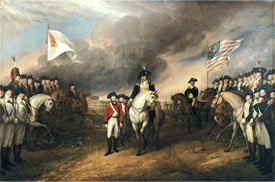|
|
|
|
|
|
|
How Sound Money Won the Battle of
Yorktown—and Saved the American Revolution
Larry Reed
|
|
|
America is a nation whose very
independence was first jeopardized by unbacked paper money only to be purchased
later by precious metals.
That???s a story often left out of
history classes but I summarized it in The Times That Tried Men???s Economic
Souls. After the runaway inflation of continental dollars, I explained...
|
|
|
|
A currency
reform in 1780 asked everyone to turn in the old money for a new one at the ratio
of 20 to 1.
Congress offered to redeem the paper in gold in 1786, but this didn???t wash
with a citizenry already burned by paper promises.
The new
currency plummeted in value until Congress was forced to get honest.
|
|
|
|
|
|
By
1781 it abandoned its legal-tender laws and started paying for supplies in
whatever gold and silver it could muster from the states or convince a friend
(like France) to lend it.
Not by
coincidence, supplies and morale improved, which helped to bring the war to a
successful end just two years later.
|
The enemy observed the last days of
the continental hyperinflation with delight, expecting that it was a harbinger of
inevitable British victory. Historian Barbara A. Mitchell writes,
As the government
printed more money, Continental currency continued to hyperinflate. The council in
Philadelphia began publishing the month-to-month rates of currency to specie,
which weary consumers then multiplied by three.
When the currency
finally collapsed in May 1781, its ratio to specie was officially 175 to 1, or 525
to 1 by public reckoning. A spirited procession was staged in Philadelphia to mark
its collapse, with people marching with dollars in their hats as paper plumes. An
unhappy dog trotted alongside, tarred and pasted with the worthless paper.
|
|
|
|
America???s war with its
mother country commenced in 1775 but as late as 1780, it wasn???t going well for the
rebels. General George Washington???s troops had lost more battles than they won.
While Congress paid in depreciating paper, supplies, and suppliers ran for the
hills.
Washington???s troops hadn???t
been paid in months. With families at home that depended upon them, it was not at
all clear that those troops would stick around.
|
|
|
|
Rumors swirled that the Army might
melt away in a desperate act of mass desertion. Mitchell reveals,
|
As he planned for the
Yorktown campaign, Washington was desperate for hard currency to pay his troops.
He wrote to Robert
Morris [the famous patriot and financier of the Revolution]: ???I must entreat you,
if possible, to procure one month???s pay in specie for the detachment under my
command. Part of the troops have not been paid anything for a long time past and
have upon several occasions shown marks of great discontent,??? an understated
reference to the mutinies by some Continental troops and the general unrest among
many.
|
Then the unexpected occurred and
dramatically changed the course of the war. Two hundred and forty-one years ago
this week, sound money helped save the day during the critical Battle of Yorktown.
A French naval fleet under the command
of Admiral de Grasse was well aware of the dire financial straits of Washington???s
army.
De Grasse stopped in Havana, Cuba in
mid-August, expecting to secure the gold and silver (mostly from mines in Mexico)
he planned to deliver to the Americans, only to discover that the specie hadn???t
yet arrived.
So, he solicited private contributions
from the residents of Havana, who came through with an amazing half million pesos
in silver and a smaller measure of gold—enough to pay Washington???s men and
keep the Continental Army intact.
|
|
|
De Grasse knew that the
clock was ticking, that Washington would soon move on Yorktown, and that London
would send a fleet to relieve British troops holed up in the city.
To the enormous
satisfaction of Washington and his men, de Grasse arrived in time. The troops were
paid in sound money!
|

|
Surrender
of Lord Cornwallis, by John Trumbull
|
|
|
|
|
The three-week siege of Yorktown ended
on October 17 when British General Cornwallis, unable to escape by sea because of
the French fleet, surrendered.
The war that so few once thought could
ever end in American victory, was effectively over.
I cannot recall any moment in history when either an army or a cause
was mortally endangered by sound money and was saved at the last minute by
depreciated, fiat-paper money.
Yorktown was a victory every lover
of liberty and sound money should celebrate, now and forever.
|
|
|
|
|
|
|
|
|
|
This copyrighted material may not
be republished without express permission. Offer only available through email
promotion. Offer does not apply to previous orders and may not be combined with
any other offer or program. Special shipping rates or other restrictions may apply
to international orders. The information presented here is for general educational
purposes only. Money Metals Exchange and its staff do not act as personal
investment advisors. Nor do we advocate the purchase or sale of any regulated
security listed on any exchange for any specific individual. While our track
record is excellent, investment markets have inherent risks and there can be no
assurance of future profits. You are responsible for your investment decisions,
and they should be made in consultation with your own advisors. By purchasing from
Money Metals, you understand our company is not responsible for any losses caused
by your investment decisions, nor do we have any claim to any market gains you may
enjoy. Money Metals Exchange is not a regulated trading ???exchange??? as defined by
the CFTC and the SEC.
|
|
|

